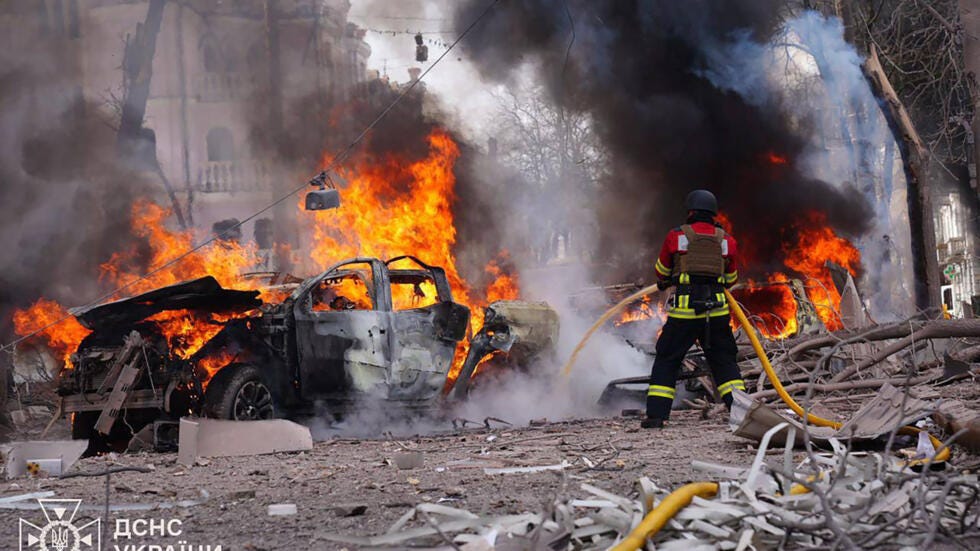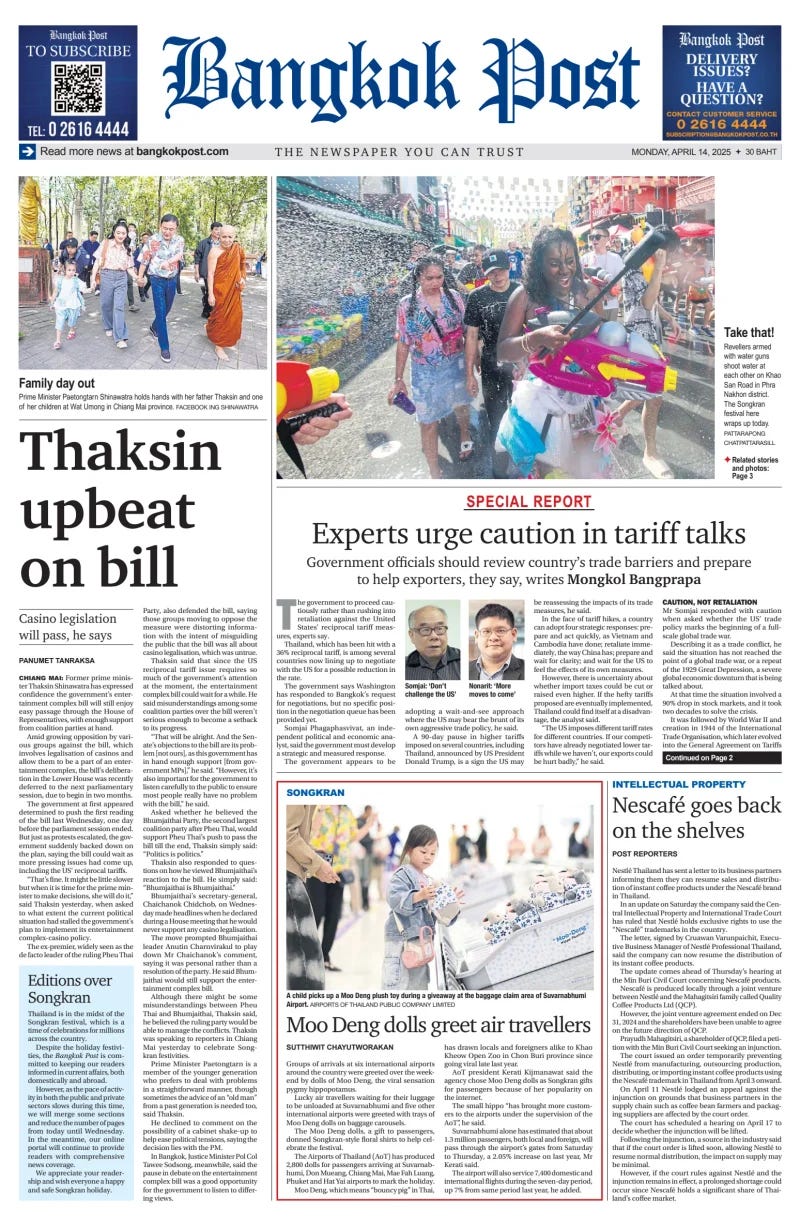Ukraine on Edge After Russian Strike; Zelensky Issues Grim Warning
The Ukrainian leader says the security of the entire world is at stake

Ukrainian President Volodymyr Zelensky says he fears Russia's three-year war on Ukraine could escalate if Ukraine, supported by its allies, does not stand firm against further Russian military advancement. Zelensky said that at this moment in the war, the security of the entire world is at stake. "If we do not stand firm, he (Russian President Vladimir Putin) will advance further," Zelensky told CBS’s 60 Minutes. "It is not just idle speculation; the threat is real. Putin's ultimate goal is to revive the Russian empire and reclaim territories currently under NATO protection. Considering all of this, I believe it could escalate into a world war." He added: "There won't be a safe place, there won't be a safe place for (anyone)." Zelensky said he would welcome Mr. Trump in Ukraine so he could "understand what's going on here…We respect your position," he said in English, in an invitation directed to Mr. Trump, "but, please, before any kind of decisions, any kind of plans for negotiations, come to see the people, civilians, warriors, hospitals, churches, children destroyed or dead…Come, look, and then let's move with a plan on how to finish the war. You will understand with whom you have a deal. You will understand what Putin did."
Russian forces launched a missile strike on the city of Sumy that local authorities in Ukraine said left at least 34 people dead on April 13, prompting condemnation from Ukrainian leaders, the United States, the European Union, and the UN. Ukraine's state emergency service said two children were among those killed. At least 119 people were also injured in the incident, including 15 children. UN chief Antonio Guterres "deeply alarmed and shocked'" by the attack in Sumy, his spokesman stated, saying it "continues a devastating pattern of similar assaults on Ukrainian cities and towns in recent weeks." US President Donald Trump said the Russian strike on Sumy was a "horrible thing." He added: "I think it was terrible. And I was told they made a mistake. But I think it's a horrible thing. I think the whole war is a horrible thing," he told reporters aboard Air Force One on his journey back to Washington from Florida, although he didn't specify what he meant by "made a mistake." Moscow has denied allegations of deliberately striking civilian targets in Ukraine throughout the war, even though repeated attacks on hospitals, schools, energy facilities, and residential buildings have been documented throughout the conflict - RFE/RL (In all, an estimated 13,000 civilians have been killed in Ukraine since the start of the war, including around 600 children).
A separate Russian drone attack early Monday left five people injured in the southern Ukrainian port city of Odesa. Photos and videos posted online showed damage to a medical institution, business and residential buildings, a service station and vehicles. Explosions were also heard in Kherson, Suspilne reported.
People's Republic of China (PRC) military officials have reportedly visited the frontline in Ukraine to glean insights for future warfare amid reports that at least 155 Chinese nationals are fighting in Ukraine. An unnamed former Western intelligence official told Reuters that the PRC authorized an unspecified number of PRC military officers to visit the frontline in Ukraine alongside the Russian military to gain tactical insights from the war in Ukraine but did not specify when these visits may have occurred. The Institute for the Study of War (ISW) cannot independently verify this report. Two unnamed US officials familiar with US intelligence and the former Western intelligence official told Reuters that roughly 100 to 200 Chinese nationals are fighting for the Russian military as "mercenaries" independent from the Chinese government. The sources further noted that the Chinese fighters appear to have minimal training and are not having any discernable impact on Russian military operations. ISW has observed reports that these Chinese nationals likely signed contracts with the Russian Ministry of Defense (MoD) of their own accord rather than at the direction of PRC officials. Ukrainian President Volodymyr Zelensky recently reported that Ukrainian intelligence discovered that at least 155 Chinese nationals were fighting for the Russian military in Ukraine. PRC Ministry of Foreign Affairs (MFA) Spokesperson Lin Jian recently stated that it is unaware of the more than 155 Chinese nationals fighting in Ukraine, however. The Guardian recently reported that Russian entities are actively operating recruitment campaigns across several Chinese social media networks, further suggesting that the PRC government may be aware of Russian military recruitment efforts targeting Chinese citizens and may be disinterested in combating these efforts
US President Donald Trump’s decision to exempt some electronics from steep tariffs on Chinese imports offered a reprieve for some of America’s biggest tech companies and signaled a further softening of the president’s aggressive trade agenda. The Trump administration, which paused the heightened “Liberation Day” tariffs for 90 days last week — except those on China — remains unpredictable, however: US Commerce Secretary Howard Lutnick on Sunday said the electronic exception is temporary, and that new “semiconductor tariffs” could come in “a month or two,” without offering specifics. The tech reprieve is “an astonishing U-turn” on principles that Donald Trump has championed throughout the entire tariff saga — reshoring American manufacturing and addressing trade imbalances, the BBC’s economics editor wrote. While global markets could bounce back up on Monday as a result, Trump has only added to the overarching chaos and uncertainty, weakening the US’ position in any new trade deal negotiations. The various delays and exemptions also undercut companies’ abilities to make investments and even short-term business decisions. “Every 48 hours, the White House is announcing, or un-announcing, or re-announcing, or creating massive carve outs to, a new trade rule,” The Atlantic’s Derek Thompson wrote. “Why would anyone anywhere build a new factory under these conditions?” - Semafor
Chinese leader Xi Jinping begins a visit to Southeast Asia on Monday, in an effort to strengthen Beijing’s regional economic ties following US President Donald Trump’s tariff salvo, reported Semafor. With stops planned in Vietnam, Cambodia, and Malaysia, Xi is expected to cast China as a reliable trading partner, in contrast to the unpredictability of Trump’s Washington. But the three smaller nations must perform a diplomatic balancing act: Officials are likely wary of cozying up to China while pursuing trade deals with Trump, and they want to protect their domestic economics from a glut of cheap Chinese goods suddenly shut out from the US market. Even amid the chaos, no Southeast Asian country “has given up yet on its relationship with America,” The Economist wrote.
A wave of Israeli strikes across Gaza on Sunday hit a hospital and other sites, killing at least 21 people, including children, as Israel vowed to expand its security presence in the small coastal strip. The predawn strike on Al-Ahli Hospital in Gaza City was the latest of several attacks on northern Gaza’s last major hospital providing critical health care. Hospital director Dr. Fadel Naim said the emergency room, pharmacy and surrounding buildings were severely damaged, affecting over 100 patients and dozens of staff. One patient, a girl, died during the evacuation following an Israeli warning because staff were unable to provide urgent care, Gaza’s Health Ministry said. Israel said it struck a Hamas command and control center at the hospital, without providing evidence. Hamas denied the allegations. Al-Ahli Hospital is run by the Episcopal Diocese of Jerusalem, which condemned the attack, saying in a statement it happened on “Palm Sunday, the start of the Holy Week, the most sacred week of the Christian year.” Palm Sunday commemorates Jesus’ entry into Jerusalem, and worshipers in Gaza City marked it in a church whose gilded trim and intact walls were a contrast to the widespread debris elsewhere - AP
In the two years since the simmering conflict between the generals of the Sudanese Armed Forces and the Rapid Support Forces (RSF) erupted into war, Sudan has been on a downward spiral on many levels. According to the UN, the country in northeastern Africa, rich in gold, oil and fertile grounds, has been plunged into one of the world's largest humanitarian and displacement crises. Of the population of 51 million, 64 percent now depend on humanitarian assistance and some 12 million have been displaced. Sudanese women and girls have been particularly affected by the crisis, as they not only make up most of the displaced but also suffer from widespread sexual assault and gang rape. Estimates on the death toll remain difficult due to ongoing fighting, but latest numbers by international aid organizations have jumped from around 40,000 to 150,000. As the war enters its third year on April 14th, the country increasingly risks being split into two rival administrations. Earlier this year the SAF recaptured Khartoum, and they now control most of the country's north and east, and the central city of Wad Madani in the widely destroyed agricultural region. The RSF, which emerged from the notorious Janjaweed militia, have emerged as major force in Sudan's western Darfur region. Both sides continue to besiege several refugee camps in Darfur's capital, El Fasher, where famine and constant shelling are killing civilians - DW





